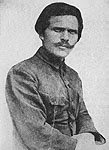Zum diesjährigen Geburtstag der US-amerikanischen
"Anarchistin ohne Adjektive" und weil die Poesie auf diesem Blog doch etwas kurz kommt heute ein Gedicht von
Voltairine de Cleyre, geschrieben im September 1894 in Philadelphia.
The Suicide's Defense
(Of all the stupidities wherewith the law-making power has signaled its own incapacity for dealing with the disorders of society, none appears so utterly stupid as the law which punishes an attempted suicide. To the question "What have you to say in your defense?" I conceive the poor wretch might reply as follows.)
To say in my defense? Defense of what?
Defense to whom? And why defense at all?
Have I wronged any? Let that one accuse!
Some priest there mutters I "have outraged God"!
Let God then try me, and let none dare judge
Himself as fit to put Heaven's ermine on!
Again I say, let the wronged one accuse.
Aye, silence! There is none to answer me.
And whom could I, a homeless, friendless tramp,
To whom all doors are shut, all hearts are locked,
All hands withheld— whom could I wrong, indeed
By taking that which benefited none
And menaced all?
Aye, since ye will it so,
Know then your risk. But mark, 'tis not defense,
'Tis accusation that I hurl at you.
See to't that ye prepare your own defense.
My life, I say, Is an eternal threat
To you and yours; and therefore it were well
To have foreborne your unasked services.
And why? Because I hate you! Every drop
of blood that circles in your plethoric veins
Was wrung from out the gaunt and sapless trunks
Of men like me, who in your cursed mills
Were crushed like grapes within the wine-press ground.
To us ye leave the empty skin of life;
The heart of it, the sweet of it, ye pour
To fete your dogs and mistresses withal!
Your mistresses! Our daughters! Bought, for bread,
To grace the flesh that once was father's arms!
Yes, I accuse you that ye murdered me!
Ye killed the Man— and this that speaks to you
Is but the beast that ye have made of me!
What! Is it life to creep and crawl an beg,
And slink for shelter where rats congregate?
And for one's ideal dream of a fat meal?
Is it, then, life, to group like pigs in sties,
And bury decency in common filth,
Because, forsooth, your income must be made,
Though human flesh rot in your plague-rid dens?
Is it, then, life, to wait another's nod,
For leave to turn yourself to gold for him?
Would it me life to you? And was I less
Than you? Was I not born with hopes and dreams
And pains and passions even as were you?
But these ye have denied. Ye seized the earth,
Though it was none of yours, and said: "Hereon
Shall none rest, walk or work, till first to me
Ye render tribute!" Every art of man,
Born to make light of the burdens of the world,
Ye also seized, and made a tenfold curse
To crush the man beneath the thing he made.
Houses, machines, and lands— all, all are yours;
And us you do not need. When we ask work
Ye shake your heads. Homes?— Ye evict us. Bread?—
"Here, officer, this fellow's begging. Jail's
the place for him!" After the stripes, what next?
Poison!— I took it!— Now you say 'twas sin
To take this life which troubled you lo much.
Sin to escape insult, starvation, brands
Of felony, inflicted for the crime
Of asking food! Ye hypocrites! Within
Your secret hearts the sin is that I failed!
Because I failed ye judge me to the stripes.
And the hard tail denied when I was free.
So be it. But beware!— a Prison cell's
An evil bed to grow morality!
Black swamps breed black miasms; sickly soils
Yield poison fruit; snakes warmed to life will sting.
This time I was content to go alone;
Perchance the next I shall not be so kind.










